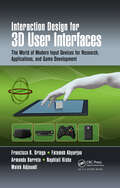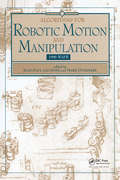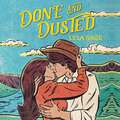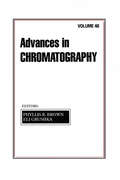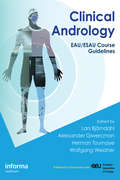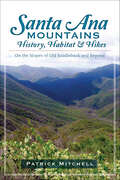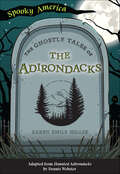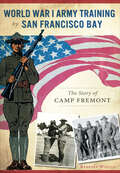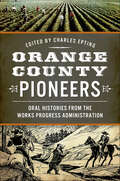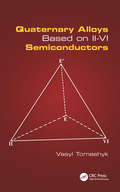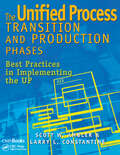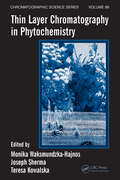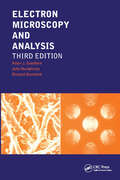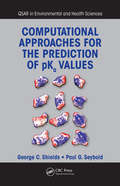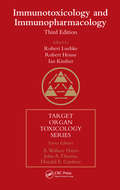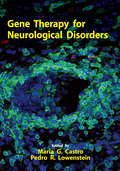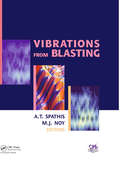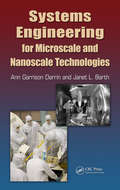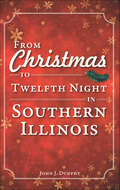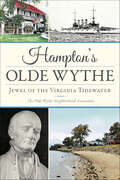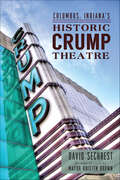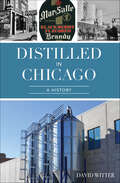- Table View
- List View
Medical Management of Infectious Disease
by Christopher GraceThis text gathers information concerning the diagnosis and management of adult patients with infections in the outpatient setting. It includes tables, algorithms, pictures and diagrams to clarify and consolidate crucial points. Each chapter features key points boxes that summarize important topics and help direct providers to critical information.
Interaction Design for 3D User Interfaces: The World of Modern Input Devices for Research, Applications, and Game Development
by Francisco R. Ortega Fatemeh Abyarjoo Armando Barreto Naphtali Rishe Malek AdjouadiThis book addresses the new interaction modalities that are becoming possible with new devices by looking at user interfaces from an input perspective. It deals with modern input devices and user interaction and design covering in-depth theory, advanced topics for noise reduction using Kalman Filters, a case study, and multiple chapters showing hands-on approaches to relevant technology, including modern devices such as the Leap-Motion, Xbox One Kinect, inertial measurement units, and multi-touch technology. It also discusses theories behind interaction and navigation, past and current techniques, and practical topics about input devices.
Heart Rate Variability (HRV) Signal Analysis: Clinical Applications
by Markad V. Kamath Mari A. Watanabe Adrian R.M. UptonOpen a Window into the Autonomic Nervous SystemQuantifying the amount of autonomic nervous system activity in an individual patient can be extremely important, because it provides a gauge of disease severity in a large number of diseases. Heart rate variability (HRV) calculated from both short-term and longer-term electrocardiograms is an ideal win
Algorithms for Robotic Motion and Manipulation: WAFR 1996
by Mark Overmars Jean-Paul LaumondThis volume deals with core problems in robotics, like motion planning, sensor-based planning, manipulation, and assembly planning. It also discusses the application of robotics algorithms in other domains, such as molecular modeling, computer graphics, and image analysis. Topics Include: - Planning - Sensor Based Motion Planning - Control and Moti
Done and Dusted: The must-read, small-town romance and TikTok sensation! (Rebel Blue Ranch)
by Lyla Sage'A sweet slow burn . . . sunshine in written form' - Lana Ferguson, USA Today bestselling authorShe's off-limits, but he's never been good at following the rules . . .For the first time in her life, Clementine 'Emmy' Ryder has no idea what she's doing. She's accomplished everything on her to-do list. She left her small hometown of Meadowlark, Wyoming, went to college, and made a career for herself by doing her favorite thing: riding horses. But after an accident makes it impossible for her to get back into the saddle, she has no choice but to return to the hometown she always wanted to escape.Luke Brooks is Meadowlark's most notorious bad boy, bar owner, and bachelor. He's also the unofficial fifth member of the Ryder family. As Emmy's older brother's best friend, Luke spent most of his childhood antagonizing her. It's been years since he's seen her, but when she walks into his bar and back into his life, he can't take his eyes off her. Against his better judgment, he wants to do a whole lot more than just look at her.As things between Emmy and Brooks heat up, it gets more difficult for him to keep his hands off of her. Can he help her get her spark back? Or will they both go up in flames? Readers love Done and Dusted . . . 'Fun, sweet and steamy' ⭐⭐⭐⭐⭐'I devoured this book, it was so effortless to read, I loved every second of it. LUKE BROOKS!!!! Hands down the perfect man 🤠' ⭐⭐⭐⭐⭐'SUCH a joy to read' ⭐⭐⭐⭐⭐'Why has it taken me so long to read this book!? . . . I'm obsessed' ⭐⭐⭐⭐⭐'I'm officially in my yeehaw era' ⭐⭐⭐⭐⭐'Is there anything hotter than a cowboy who's sweet but also talks dirty?' ⭐⭐⭐⭐⭐'The most perfect small town cowboy romance' ⭐⭐⭐⭐⭐'Made my bookish heart so happy' ⭐⭐⭐⭐⭐'Simply gorgeous! I absolutely loved the writing and fell in love with the characters' ⭐⭐⭐⭐⭐'Super cute and fun' ⭐⭐⭐⭐⭐This audiobook contains an exclusive Q&A with the author.
Advances in Chromatography: Volume 40 (Advances in Chromatography)
by Eli Grushka Phyllis R. Brown"Volume 40 presents an authoritative selection of the best and most up-to-date research findings in separation science. Surveys recent developments in high performance-liquid (HPLC), reversed-phase liquid (RPLC), countercurrent (CCC), and micellar electrokinetic chromatography (MEKC)."
Clinical Andrology: EAU/ESAU Course Guidelines
by Lars Björndahl Wolfgang Weidner Aleksander Giwercman Herman TournayeA major new international reference work on andrology from the EAU Section of Andrological Urology � covering such issues as male infertility, erectile dysfunction, late-onset hypogonadism, and reproductive cancers � that engages with contemporary concern for evidence based practice, minimizing interventions, and promoting male reproductive heal
Santa Ana Mountains History, Habitat and Hikes: On the Slopes of Old Saddleback and Beyond
by Patrick MitchellThe majestic Santa Ana Mountains cover one thousand square miles and much of the Cleveland National Forest in Orange, Riverside and San Diego Counties. Unlike other designated wild lands close to huge population centers, the rugged Santa Anas remain largely primordial. Dominated by Old Saddleback and its twin peaks of Modjeska and Santiago, this beautiful range, visible from much of the Los Angeles Basin, remains the last intact coastal ecosystem in Southern California. Home to Native Americans, Spanish missionaries, vaqueros, sheep barons, bandits and suburban developers, the Santa Anas were traversed by mountain man Jedediah Smith, explorer John C. Fremont, lawman Wyatt Earp and other historic figures. Join author Patrick Mitchell for this first comprehensive volume on the natural and cultural histories of the great Santa Anas.
The Ghostly Tales of the Adirondacks (Spooky America)
by Karen MillerGhost stories from the Adirondacks have never been so creepy, fun, and full of mystery!The haunted history of The Mountains comes to life--even when the main players are dead. Visit the Sagamore Resort to catch a glimpse of the spirits who checked in but never checked out. Or look for ghosts amongst the stacks at the Woodgate Free Library. Dive into this spooky chapter book for suspenseful tales of bumps in the night, paranormal investigations, and the unexplained; just be sure to keep the light on.
World War I Army Training by San Francisco Bay: The Story of Camp Fremont (Military)
by Barbara WilcoxIn 1917, Stanford University leased a portion of its land to allow the creation of Camp Fremont, headquartered in present-day Menlo Park. That brought the war into the Bay Area's backyard. Soldiers received a welcome reception, and locals embraced the potential economic opportunities. However, the military presence also revealed the conflict Americans felt over the war. Residents threatened conscientious objectors within their community, while the government mollified fears of the vice that often followed troops in training. Armistice came earlier than expected, and many soldiers trained for combat they never saw. But all contributed to the growth and change that arrived with the modern era. Author Barbara Wilcox tells Camp Fremont's story of adaptability, bravery and extraordinary accomplishment during the Great War.
Orange County Pioneers: Oral Histories from the Works Progress Administration
by Charles EptingOrange County's pioneer history is filled with harrowing tales every bit as entertaining as a western novel. These stories, culled from oral histories recorded by old-timers in the 1930s as part of the Works Progress Administration, offer a rarely seen look into Orange County's frontier days. From bear hunts and bullfights to social gatherings at the home of the most famous Shakespearean actress of the day, these tales are a window into the earliest days of every corner of the county. Join editor Charles Epting for these wonderfully evocative portraits of the past recounted in the words of the eyewitnesses.
Quaternary Alloys Based on II - VI Semiconductors
by Vasyl TomashykDoped by isovalent or heterovalent foreign impurities, II-VI semiconductor compounds enable control of optical and electronic properties, making them ideal in detectors, solar cells, and other precise device applications. Quaternary alloys allow a simultaneous adjustment of band gap and lattice constant, increasing radiant efficiency at a wide rang
The Unified Process Transition and Production Phases: Best Practices in Implementing the UP
by Scott W. Ambler Larry ConstantineIs the Unified Process the be all and end all standard for developing object-oriented component-based software? This book is the final in a four volume series that presents a critical review of the Unified Process. The authors present a survey of the alte
Thin Layer Chromatography in Phytochemistry (Chromatographic Science Series)
by Joseph Sherma Teresa Kowalska Monika Waksmundzka-HajnosThin layer chromatography (TLC) is increasingly used in the fields of plant chemistry, biochemistry, and molecular biology. Advantages such as speed, versatility, and low cost make it one of the leading techniques used for locating and analyzing bioactive components in plants.Thin Layer Chromatography in Phytochemistry is the first sourc
Electron Microscopy and Analysis
by Peter J. Goodhew John HumphreysElectron Microscopy and Analysis deals with several sophisticated techniques for magnifying images of very small objects by large amounts - especially in a physical science context. It has been ten years since the last edition of Electron Microscopy and Analysis was published and there have been rapid changes in this field since then. The authors h
Computational Approaches for the Prediction of pKa Values (QSAR in Environmental and Health Sciences)
by George C. Shields Paul G. SeyboldThe pKa of a compound describes its acidity or basicity and, therefore, is one of its most important properties. Its value determines what form of the compound-positive ion, negative ion, or neutral species-will be present under different circumstances. This is crucial to the action and detection of the compound as a drug, pollutant, or other activ
Excipient Development for Pharmaceutical, Biotechnology, and Drug Delivery Systems
by Ashok Katdare Mahesh V. ChaubalTo facilitate the development of novel drug delivery systems and biotechnology-oriented drugs, the need for new, yet to be developed, and approved excipients continues to increase. Excipient Development for Pharmaceutical, Biotechnology, and Drug Delivery Systems serves as a comprehensive source to improve understanding of excipients and forge potential new avenues for regulatory approval. This book presents detailed, up-to-date information on various aspects of excipient development, testing, and technological considerations for their use. It addresses specific details such as historical perspective, preclinical testing, safety, and toxicology evaluation, as well as regulatory, quality, and utility aspects. The text also describes best practices for use of various functional excipients and extensive literature references for all topics.
Immunotoxicology and Immunopharmacology
by Robert Luebke Ian Kimber Robert HouseContinuing the tradition set by the first and second editions, each a bestseller in its own right, the third edition of Immunotoxicology and Immunopharmacology provides reviews of environmental agents, updated to reflect the latest information on how these agents influence immune system function and health. For the first time in the book's history,
Gene Therapy for Neurological Disorders
by Pedro R. Lowenstein Maria G. CastroCoedited by internationally recognized leaders in gene therapy research, this guide supplies the most recent advances, studies, and expert opinion on gene therapy for neurological disorders. Spanning conditions such as Parkinsons's and Alzheimer's disease, multiple sclerosis, brain tumors, stroke, epilepsy, and brain and spinal cord trauma, this reference presents the basic science and applications of recombinant gene products, immune and stem cell-mediated therapeutic strategies, and brain tumor gene therapy.
Vibrations from Blasting: Workshop hosted by Fragblast 9 - the 9th International Symposium on Rock Fragmentation by Blasting
by A. T. Spathis M. J. NoyCollection of excellent articles presenting the latest developments in blast vibration measurements, modeling and mitigation techniques. Includes contributions on novel environmentally-induced vs blast-induced movements, non-conventional geophysical processing techniques, new modeling approaches, mitigation techniques using smarter blasting methods
Systems Engineering for Microscale and Nanoscale Technologies
by M. Ann Garrison Darrin Janet L. BarthTo realize the full potential of micro- and nanoscale devices in system building, it is critical to develop systems engineering methodologies that successfully integrate stand-alone, small-scale technologies that can effectively interface with the macro world. So how do we accomplish this?Systems Engineering for Microscale and Nanoscale Technologie
From Christmas to Twelfth Night in Southern Illinois
by John J. DunphyJourney to a region where all the perennials are said to bloom at midnight on Christmas Eve and where a family's luck is determined by the first person to walk through their door on New Year's Day. Spend a literary Christmas in Herrin, listen to the twelve bells of Belleville ring out the coming year and greet the Three Kings of Germantown at Epiphany. Whether you are a newcomer to southern Illinois or whether you feel like you have been singing "La Guiannee" since the tradition started in Prairie du Rocher in 1720, join John J. Dunphy for a season of sacred memories and merry recollections.
Hampton's Olde Wythe: Jewel of the Virginia Tidewater
by The Olde Wythe Neighborhood AssociationWhile the Olde Wythe neighborhood in Hampton looks like many of the picturesque communities in America, its past is one all its own. The area's namesake, George Wythe, was a signer of the Declaration of Independence, a delegate to the Constitutional Convention and a man opposed to slavery who freed his own slaves and suffered arsenic poisoning for his position. Olde Wythe battled a British invasion during the War of 1812 and witnessed intense ironclad battles fought near its shores during the Civil War. Join the Olde Wythe Neighborhood Association as it presents the colorful and harrowing history of Hampton's Olde Wythe.
Columbus Indiana's Historic Crump Theatre (Landmarks)
by David SechrestNot since the construction of the Columbus courthouse had one man and his vision received as much publicity from local newspapers as John Crump and his theater, designed and built by architect Charles Sparrell in 1889. This is the story of the passion, struggles and triumphs that created the first true cultural arts center in this small town and the legacy that continues to inspire the community over a century later to protect this local landmark. It is a journey marked by first-class opera performances, flickering silent films, police intervention and arrests and, ultimately, decay and closure. A portion of the proceeds from sales of this book will go to the Heritage Fund in support of the Crump Theatre building--an architectural treasure in a city that boasts many.
Distilled in Chicago: A History (American Palate)
by David WitterFrom the mash in pioneer stills to the Malört in a hipster's shot glass , David Witter explores how liquor has influenced nearly two centuries of Chicago's existence.Follow the trickle of alcohol through Chicago's history, starting with the town's first three permanent businesses: The Wolf, Green Tree and Eagle Exchange Taverns. Stir together stories from the Peoria Whiskey Trust and the Temperance Movement. The cocktails that lubricated the Levee District may have set up Chicago's first gangsters, but Prohibition-era bootleggers would change the city's identity forever. Post-Prohibition alcohol helped to create vast fortunes for Chicago based families and corporations, and the new Millennium saw KOVAL usher in a new era small and craft distilleries throughout Chicagoland. Sample a spirited history of the Windy City.

